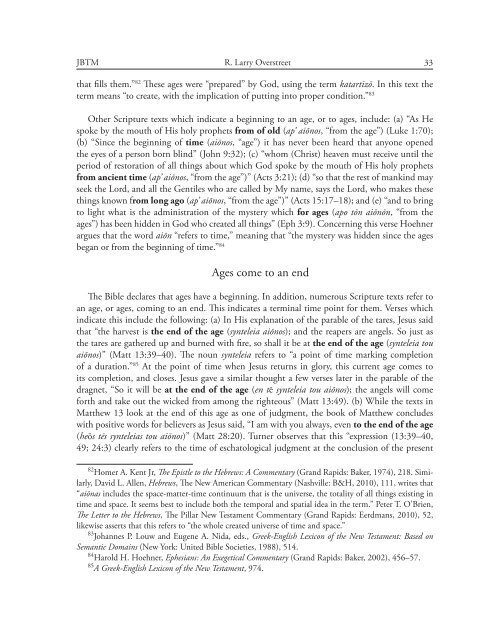JBTM_10-2_Fall_2013
JBTM_10-2_Fall_2013
JBTM_10-2_Fall_2013
Create successful ePaper yourself
Turn your PDF publications into a flip-book with our unique Google optimized e-Paper software.
<strong>JBTM</strong><br />
R. Larry Overstreet<br />
33<br />
that fills them.” 82 These ages were “prepared” by God, using the term katartizō. In this text the<br />
term means “to create, with the implication of putting into proper condition.” 83<br />
Other Scripture texts which indicate a beginning to an age, or to ages, include: (a) “As He<br />
spoke by the mouth of His holy prophets from of old (ap’ aiōnos, “from the age”) (Luke 1:70);<br />
(b) “Since the beginning of time (aiōnos, “age”) it has never been heard that anyone opened<br />
the eyes of a person born blind” (John 9:32); (c) “whom (Christ) heaven must receive until the<br />
period of restoration of all things about which God spoke by the mouth of His holy prophets<br />
from ancient time (ap’ aiōnos, “from the age”)” (Acts 3:21); (d) “so that the rest of mankind may<br />
seek the Lord, and all the Gentiles who are called by My name, says the Lord, who makes these<br />
things known from long ago (ap’ aiōnos, “from the age”)” (Acts 15:17–18); and (e) “and to bring<br />
to light what is the administration of the mystery which for ages (apo tōn aiōnōn, “from the<br />
ages”) has been hidden in God who created all things” (Eph 3:9). Concerning this verse Hoehner<br />
argues that the word aiōn “refers to time,” meaning that “the mystery was hidden since the ages<br />
began or from the beginning of time.” 84<br />
Ages come to an end<br />
The Bible declares that ages have a beginning. In addition, numerous Scripture texts refer to<br />
an age, or ages, coming to an end. This indicates a terminal time point for them. Verses which<br />
indicate this include the following: (a) In His explanation of the parable of the tares, Jesus said<br />
that “the harvest is the end of the age (synteleia aiōnos); and the reapers are angels. So just as<br />
the tares are gathered up and burned with fire, so shall it be at the end of the age (synteleia tou<br />
aiōnos)” (Matt 13:39–40). The noun synteleia refers to “a point of time marking completion<br />
of a duration.” 85 At the point of time when Jesus returns in glory, this current age comes to<br />
its completion, and closes. Jesus gave a similar thought a few verses later in the parable of the<br />
dragnet, “So it will be at the end of the age (en tē synteleia tou aiōnos); the angels will come<br />
forth and take out the wicked from among the righteous” (Matt 13:49). (b) While the texts in<br />
Matthew 13 look at the end of this age as one of judgment, the book of Matthew concludes<br />
with positive words for believers as Jesus said, “I am with you always, even to the end of the age<br />
(heōs tēs synteleias tou aiōnos)” (Matt 28:20). Turner observes that this “expression (13:39–40,<br />
49; 24:3) clearly refers to the time of eschatological judgment at the conclusion of the present<br />
82 Homer A. Kent Jr, The Epistle to the Hebrews: A Commentary (Grand Rapids: Baker, 1974), 218. Similarly,<br />
David L. Allen, Hebrews, The New American Commentary (Nashville: B&H, 20<strong>10</strong>), 111, writes that<br />
“aiōnas includes the space-matter-time continuum that is the universe, the totality of all things existing in<br />
time and space. It seems best to include both the temporal and spatial idea in the term.” Peter T. O’Brien,<br />
The Letter to the Hebrews, The Pillar New Testament Commentary (Grand Rapids: Eerdmans, 20<strong>10</strong>), 52,<br />
likewise asserts that this refers to “the whole created universe of time and space.”<br />
83 Johannes P. Louw and Eugene A. Nida, eds., Greek-English Lexicon of the New Testament: Based on<br />
Semantic Domains (New York: United Bible Societies, 1988), 514.<br />
84 Harold H. Hoehner, Ephesians: An Exegetical Commentary (Grand Rapids: Baker, 2002), 456–57.<br />
85 A Greek-English Lexicon of the New Testament, 974.


